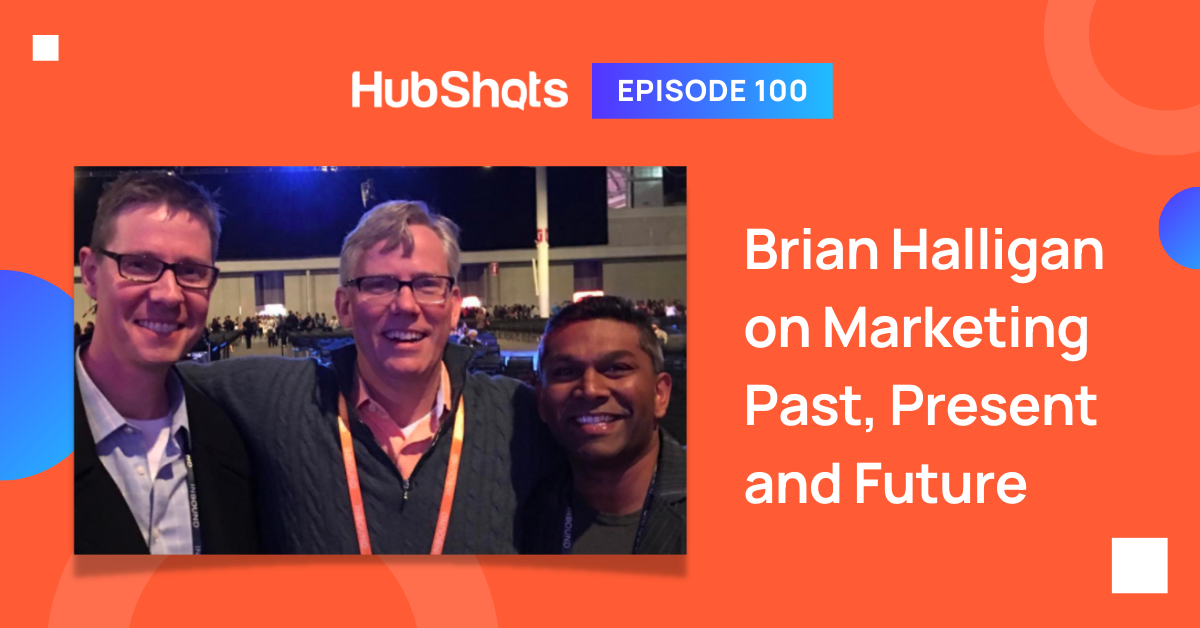Episode 238: Love and Marketing
Welcome to HubShots Episode 238: Love and Marketing This edition we dive into: Love The Bud of Mended Bones - a poem for Brian Halligan HubSpot...
Welcome to HubShots, the podcast for marketing managers who use HubSpot hosted by Ian Jacob from Search & Be Found and Craig Bailey from XEN Systems.
In this episode, we chat with Brian Halligan, CEO and Co-founder of HubSpot. We discuss marketing past, present and future.
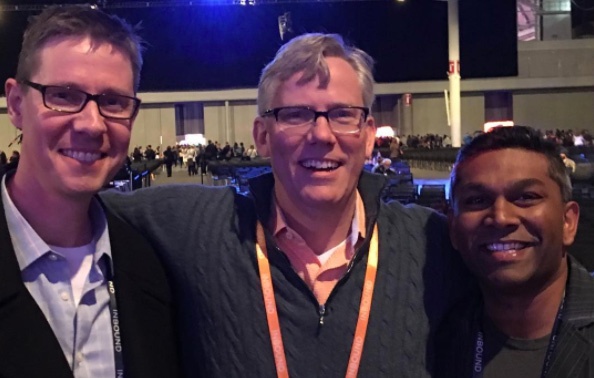
Listen to the episode here: https://soundcloud.com/hubshots/100-brian-halligan-on-marketing-past-present-and-future
Recorded: Wednesday 12 July 2017 | Published: Friday 15 September 2017
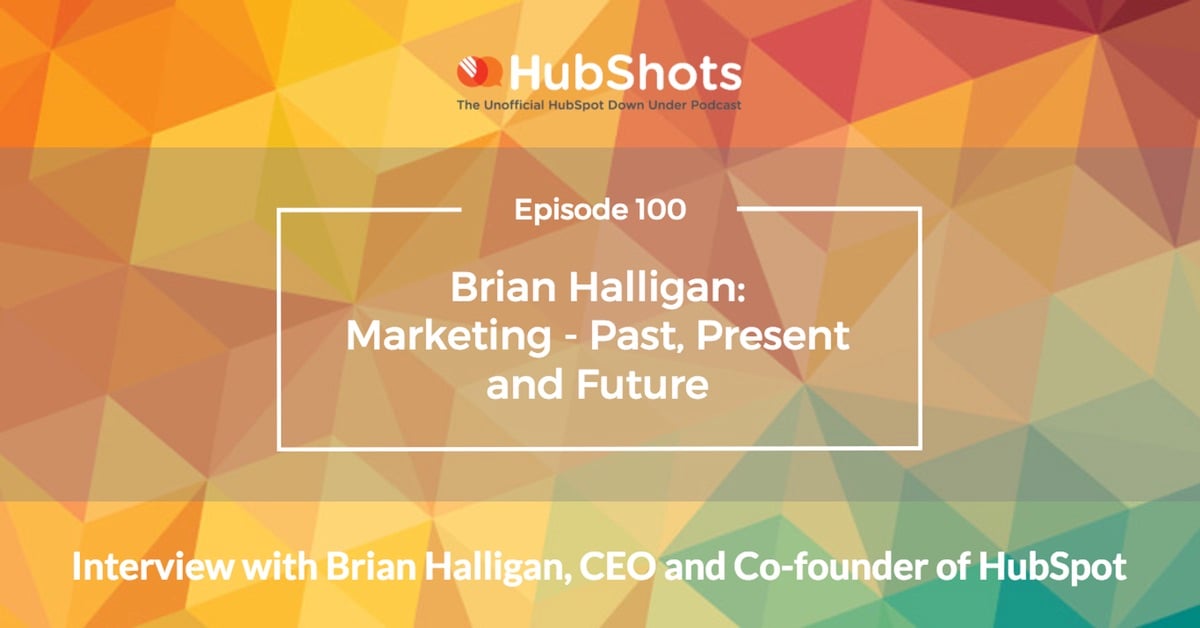
To kick things off we started by asking Brian about his new guitar...
Back to top
Brian: My new guitar is fabulous. I've been playing it and really enjoying it and it's really inspired me to step up my guitar game.
Craig: So can you give us a little bit of background about how you came to acquire the guitar? I know you're a fan of a certain band.
Back to top
Brian: Yeah. So I acquired Jerry Garcia's guitar called, "Wolf," that he played for many years, a custom guitar he had made for him. And I acquired it just a couple of weeks ago at an auction for too much money. And I remember when it first came out, a lot of people sent me a link to say, "This is an auction of Jerry Garcia's guitar, you might be interested." And I thought "Oh. it's crazy." And I started thinking about it. I was like, the Grateful Dead has had a big influence on my life.

I mean, HubSpot and the original incarnation of HubSpot is very much inspired by the Grateful Dead's business model. So the Grateful Dead is important in my life and so that was interesting to me. And secondly, the proceeds from the auction were going to the Southern Poverty Law Center. Which is a great group that basically uses legal muscle, to fight against bad folks like the Ku Klux Klan and such here in the United States. So yeah, I went for it and am really excited about it.
Back to top
Craig: As I understand it and from your book back in 2010, it's very much a contrarian approach that they took. And you see that in marketing, just mentioned in HubSpot's approach. Can you share that a bit more about that?
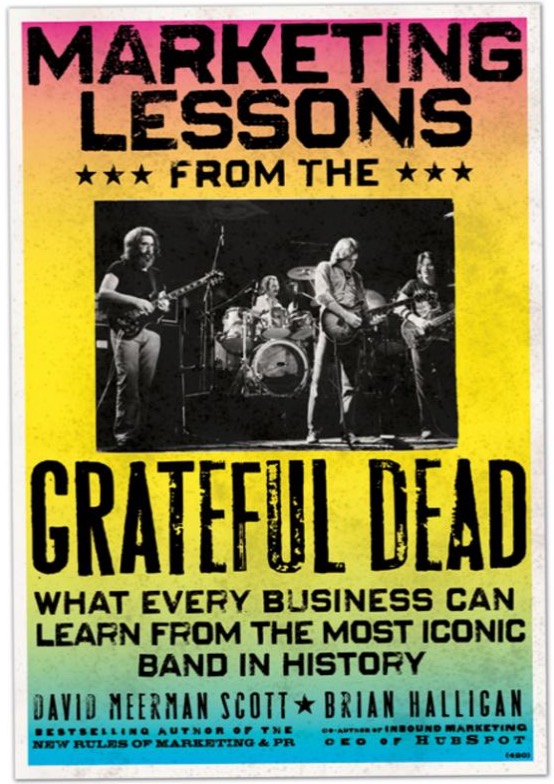
Brian: Yeah. They were sort of the very first inbound marketers where they gave away their content to pull in new customers. So let's say you went to see The Rolling Stones or Bruce Springsteen or whoever INXS or whoever your favorite band is. And you go to the Ticketmaster and you buy a ticket and you go see the concert. And you saw it in Sydney and you really enjoyed it and then you went down the road and you saw it Melbourne. It's the same exact concert. Then you went to Adelaide, it's the same exact concert. With the Grateful Dead, it's a very different model. Every night was a very different concert. And what they wanted you to do is come to the concert and record it.
So they encouraged you to bring in your camera and your recording equipment. And then if you record it and really liked it, you come back to your dorm room and you make copies of the tapes and you distribute it to all their friends. So they gave away that content and used that content to pull more and more customers in. So I'll record them and play them, let's say at a party and people would say, "Wow. This is crazy, gypsy music you're playing and how do I get involved?" And I say,"Hey. Come on the road and follow the Grateful Dead around." So they had a very unique way of pulling in customers. It's very similar to inbound marketing where you create video content, blogging content, spreading it to social media and using a very organic way to pull people in and scale your business.
Back to top
Craig: What else makes you tick? The books you read, the people that inspire you.
Craig: What's a great day look like for you?
Brian: I guess what inspires me and gets me cranking on HubSpot, you know, now that we've gotten to a certain size and we're cash flow positive. And we've got 30,000 some odd customers. I mean we've got a real thing going here. It's going great. But I wanna just have as big an impact as I can. How do I impact as many employees as I can positively, hopefully? How am I gonna help as many of my customers grow as fast as they can to realize their dreams? How do I do that with our partners and investors?
So HubSpot turns as a great platform for me to have as wide an impact as I possibly can on humanity. So I'm still very motivated by HubSpot. I really love working here, I love my colleagues. Inspired by the mission, inspired by the impact. You know, like a lot of entrepreneurs, I'm inspired by other ones. I'm inspired by what Elon Musk does. I think he's just an amazing human. I love what he did with PayPal and then he took all the money made with PayPal and he poured it into SpaceX and Tesla. 100% of it, almost went bankrupt. A really innovative guy.
I was very inspired by the same person probably you are, Steve Jobs before that. And the really innovative things he did. He was very influential on how we thought about HubSpot actually in the early days. So I'm easily inspired. I'm one of those people who is very easily inspired. I'm one of those people who goes to a movie and cry at almost every movie I go to. So I'm very easily moved and inspired by other people.
Craig: How do you follow people? Is it on social or on what you read?
Brian: I spend a fair amount of time on Medium. I follow people on Medium. I think they've done a pretty good job of encouraging folks to create high quality content that's relatively easy to access on there. I like the outside a lot. I get a newsletter, believe it or not, from a firm called, "Venture Pulse," which is basically goes out to the blogosphere and the internet. And finds all the interesting articles they could find about founders and CEOs and startups and scale ups. It's really well curated. And I read that, I kind of read that almost every day. And I scan the New York Times every day. So those are the main ones.
And then I probably hit Twitter once a day. I've got a Twitter list of maybe 30 people that say interesting stuff and I still go there. And I still find Twitter interesting. It's probably a little less interesting than it was a year ago, per se. But I still get inspired and find interesting stuff on there. And on the personal side, I'm addicted to Instagram. I go to Instagram all the time. But it's mostly personal stuff, less business stuff.
Back to top
Ian: So Brian, you were recognized in the top 10 highest rated CEOs by Glassdoor recently. What do you feel is essential to being a good CEO and a leader?
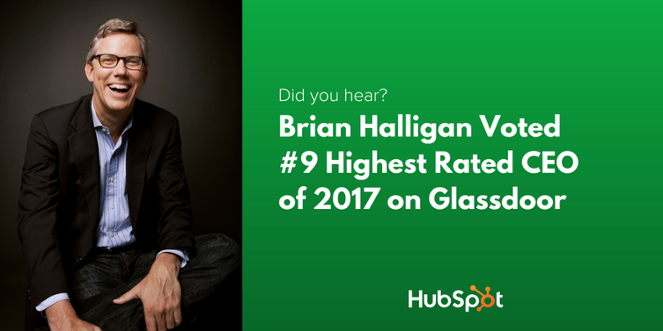
Image source: https://www.hubspot.com/company-news/brian-halligan-named-a-highest-rated-ceo-by-glassdoor
Brian: Gosh. I will say I was surprised by that. I was surprised to be ranked that high. I've never considered myself a particularly good manager, an expert at management per se. So I was thrilled and surprised. What's essential to being a good CEO? I guess I worry about a couple of things. I worry about at HubSpot, "What are we building that will delight our customers today and delight our customers, you know, a year or two from now?"
Back to top
We always try to stay a couple of steps ahead. And, "How do we sell and market those products to our customers in a way that's very efficient?" And I just try to kind of stay on those two themes and work on them incessantly, continue to evolve our go-to-market model and continue to evolve our product. And I try to keep it as simple as I can.
Back to top
Another thing I try to do is I think companies like HubSpot, most companies they say companies are more likely to die of overeating than starvation. They tend to do too many things. And so I try to stay just very focused on a couple of initiatives and drive those initiatives at HubSpot. And I'm a dog and a bone about them and I keep pushing and pushing and pushing. And I'm trying to get better at a very foreign word to a lot of entrepreneurs. It starts with N and ends O, no. It's a very hard word to say. And I'm trying to improve and say that more often. I think that's an important thing.
Back to top
Other essential things. I try to always get better like I'm a learner. I always try to learn things and try to evolve. I try to become a better CEO. I have a CEO coach, I'm always trying to improve that. Several times a year, that CEO coach gets a very detailed and thorough 360 degree review of me and gives it to me. And I've found that to be very helpful. So I'm not sure there is one thing. I'm not sure there is one thing. It's a lot of different things and a part of its being part of a great team. I've got a great team here at HubSpot and we've got great partners around us.
Back to top
Craig: Overarching against a lot of the business side is the culture of HubSpot. Interested in a few of your thoughts around culture because it does seem that's a very important piece. I'm interested in a few things. For example, when we...because as partners, we interact with HubSpot a fair bit. We find that they seem to be very much given a lot of control, a lot of autonomy, there's a lot of freedom. And I'm just wondering how you instilled that. Is that something you instilled from the start and how do you see that playing out across the company?
Brian: I'm glad to hear you say that. We try to do that. It's nice to hear it actually feels that way to our partners. We try not to create a lot of rules inside of HubSpot. We have an expression that, "You should just use good judgment." We don't have an employee handbook or things like that. We basically come in and say use good judgment. We don't want to have to tell you exactly what to do. You're an adult, we respect you. Solve for the customer, solve for the company over yourself, and try to make good decisions.
Back to top
And I find that when we trust our employees, they reward that trust back to us and they act well. And I wonder if we gave them very tight rules and really controlled them really closely, you know, what would happen? So I don't know exactly what the other side looks like. But we are a very trusting crew and we trust that people will do the right thing for the company, do the right thing for the customer, do the right thing for the partners. And that has paid off really well for us over the long haul. And I think it's allowed us to attract and retain the right types of people who enjoy that level of autonomy.
Back to top
From very early on HubSpot has used an Alpha Beta Version One approach for testing ideas quickly, in order to take them to market. We asked Brian about the benefits of this approach.
Brian: It seems like every good idea we've ever had comes from someone who's talking to customers or writing code, somebody on the front line. The further away from the front line, especially me, the less likely you are to sort of have that real great insight. And so it's part and parcel of that autonomy thing, that we want those good ideas to come from everywhere. We put our employees out in the open.
Back to top
So I sit in an open seating arrangement and I get lots of ideas just from sitting around the employees. Employees are encouraged to come up to me and talk to me. We have a Wiki. I think it must be one of the world's most active Wikis. There is, at any given time, a massive amount of conversation happening on there. And very lively conversation and people are... it's really wide-ranging, a number of topics on there. So we try to be very open, we try to be very trusting.
Back to top
Ian: And Brian I know you often sit next to people by surprise. Do you change your seat often and surprise people?
Brian: Yeah. I try to. We do something... we used to do it every three months. I don't know how often we do it now, because it's bigger. But we used to do something every three months, everyone shuffles their seat. And so you don't get too comfortable with the person sitting next to you. And the last shuffle that happened, I'm sitting next to...of all folks, the Latin American sales team. So I'm surrounded by a bunch of people speaking Spanish and Portuguese all day.
Which is pretty funny because I don't speak either of those languages. But they're a great crew, they work their butts off and they're doing a terrific job. So I really enjoyed the experiences of sitting next to those folks. But I've sat everywhere. I've sat in support, I've sat with developers, I've sat kind of everywhere. And I kind of picked something up everywhere I go. Yes, yes. That was a lot of fun.
Craig: Yeah. We loved seeing the photo of you the other day when you were answering the support calls.
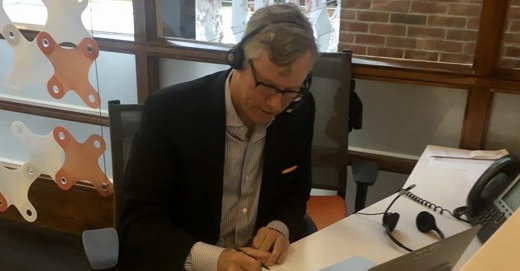
Ian: That's right.
Brian: Yes. Yes. That was a lot of fun.
Back to top
Ian: So, Brian, HubSpot has grown as an all-in-one platform. And it keeps... seem to be making inroads into sales and really closing the loop on everything that people do in a business. Has that been your vision from day one, or is it something that's evolved over time?
Back to top
Brian: It’s evolved. If I think of the journey we were on... like the first you know, several years of HubSpot, we were really just laser-focused on studying the way end users and normal humans were changing the way they behaved. And moving from newspapers to blogs and moving from radio stations to podcasts, and starting to use search engines.
Back to top
This sort of big sea change in human behavior and trying to help marketers get their heads around the fact that, "Gosh, they just don't respond to marketing anymore. You have to change the way you market to match that." And we were laser-focused on that for years and laser-focused on, "How do you turn a total absolute stranger into a visitor on your website?" And we're very good at social and blogging and content marketing and all that good stuff.
And then we started to get focused on, "Okay, now you're getting good at attracting visitors. How do you turn those visitors into qualified leads?" So we got much more into, you know, creating landing pages and forms and workflows and things like that and getting really good at that, sort of the marketing automation layer. And the last couple of years, really focused on CRM and sales. How do you turn that qualified lead into a sales rep?
But the touchstone for HubSpot, the thing that's a little bit surprising to people about HubSpot, is we're not laser-focused on what our customers are telling us they're doing. We're laser-focused on setting their eventual customer and the journey they go through with them when they buy. Because we're finding that, you know, our customers are a hair behind what human behavior actually is. And so a perfect example of that, when we first started HubSpot we saw this trend of people are reading a lot online and reading blog articles and things like that and searching a lot in Google. We were very good at helping people creating blogs, blog articles, and helping them get found in Google. That was sort of our game.
Back to top
More recently, it seems like there's a behavior shift. So people are less and less reading and more and more watching video. And less and less spending time in Google, more and more time spending time in Facebook and Instagram and whatnot. And so there is this sea shift going on and what we try to do is stay on top of that and build software and tools and training to help, you know, mere mortal businesses take advantage of that stuff. So we're on a path here that started with turning a total stranger into a visitor to, you know, how do you close that loop all the way to a customer? And just trying to add as much value as we can as we move our way down the funnel.
Back to top
Ian: Now Brian, for marketing managers who are listening who may still be considering HubSpot as a platform. What do you notice as being the biggest key pain point it should initially be applied to and what’s the biggest win they can get out of it?
Brian: You know, it's funny because people come into HubSpot with different angles. Some people come into HubSpot and say, "You know, we just don't have enough traffic and leads into our website." And so, "Boy, how do we optimize your site for Google? How do we get you cranking out great content so you can get found in Google? How do we get you cranking out great videos so you can get found in social? How do we get you setup and get that machine, lead generation machine cranking?" And that's a lot of where people coming in. Like, "How do I get my content marketing sorted out? How do I create videos? How do I create blog articles? How do I market in social and search and start pulling...how do I turn my website into a magnet?"
And then other people come in and say, you know, "I kind of have a lot of visitors to my site and I'm getting a lot of leads. What I need to do is score those leads and nurture them in really sophisticated ways and then distribute them to my sales rep to handle them in very, very smart ways?" And we help a lot with that. So boy, "You've got a lot of leads. How do you optimize your forms? How do you make sure you score those leads coming through the forms? How do you set up really smart workflows so people are getting hit via email, via social, via their site in a very personalized way and optimize that journey down the funnel?" And so there's sort of two ways people tend to come into HubSpot.
Back to top
Next we asked about how the HubSpot sales tools are helping Marketing Teams evaluate HubSpot
Ian: What I have been finding of recent is that when we've been using marketing free and say, CRM. People have actually worked out that sales is actually broken, and they're actually more interested in the [HubSpot] sales tools to start off with and then moving into marketing, which I actually find really interesting. Are you seeing this as also happening in the shift, Brian, in HubSpot?
Brian: Sure. Yeah. A big, big chunk of our marketing customers are using the CRM product before they buy the marketing. And that's pretty new as of the last six, nine months. We're definitely seeing that.
We've kind of shifted our model from 100% content marketing and putting this great content out there: Blog articles and eBooks and things, having people fill out a form, nurturing them through that form and then following them with the sales rep at the appropriate time. So it's not just about content, it's about codes. So we give away that free CRM and that's working really well. I'm really happy with that.
Back to top
My thesis on that is that the way people buy software is gonna change over time. And people are gonna wanna use it and try it and really get used to it before they buy it. And you see that when people buy products like Slack or Gmail. I think that's just the way people are gonna buy software products in the future.
And so we're trying to match the way we market and sell with the way we think humans are gonna wanna buy for the next 5, 10 years.
Back to top
In the final part of the interview we asked Brian for his views on the future of sales and marketing.]
Craig: What do you think a marketing manager, say in a mid-to-large enterprise in the next couple of years, what's gonna be significant for them?
Back to top
Brian: Yeah. I think just on the marketing side, like I think of the top of the funnel is the attract layer, "How do you attract people in?" And like I kind of said before, it was about written content in Google for many, many years. And that certainly still works and people are still using Google. But gosh, I think the attract layer is really gonna move from written to video. And you gotta get great at video. And you don't have to spend a ton of money getting great at video. You can get great at video on the cheap. And then you have to get great at social, you have to get great at Facebook.
Back to top
People live inside of Facebook and Instagram. And Mark Zuckerberg started running people's lives these days and whether you like it or not, you need to really get good at marketing in there.
Back to top
And this is not something we started the company with but advertising. Like advertising, whether you like it or not, Facebook and Instagram are becoming kind of pay to play. And advertising can be a nice complement to what you're doing on the pure content side. So that's sort of on the attract layer.
In the sort of marketing automation layer, what we're seeing inside of HubSpot is we still get lots and lots of leads through forms and white papers. But boy, an increasing number of the engagements we're having with our customers are coming through, rather than filling out a form, the call to action is actually... it's just a link to the sales rep assigned to you and you can go ahead and just book a meeting directly with the sales rep.
Back to top
So instead of having a form, filling out the form and getting nurtured and eventually the sales rep reaches out and it's a very asynchronous communication. Just cutting all that out and putting the sales rep's calendar link, effectively right on the website as a call to action. That just cuts out a lot of time for the prospect. And then the other thing that's happening sort of, I call it Convert 2.0. In addition to the forms and the calendar is chat. So more and more of our business is really coming through chat. People land on our pricing page for example or within one of our products and they start chatting with one of our sales reps or our support reps.
Back to top
And that's kind of where the conversation starts and when we look and we close the loop on, "What was that first conversion event?" Increasingly chat is a big part of that mix. So those are the two shifts I'm sort of seeing on the attract 2.0 and the convert 2.0 that I think are pretty interesting happening that are real and now in 2017.
Back to top
Craig: On the technology side around artificial intelligence (AI) and machine learning (ML), from the strategic side, are you seeing that as a key part of HubSpot's strategy in the future?
Brian: It's really a strategy now. So we've hired a lot of folks with backgrounds in that and there's a lot of teams employing artificial intelligence in this machine-learning technology happening behind the scenes. We don't necessarily expose that to you as the user. But for example, our new search engine optimization tools, much of that is using machine learning. Huge amounts of data that we have machine learning algorithms, training the data to help our customers. Our lead scoring stuff utilize heavily on machine learning to come up with the score.
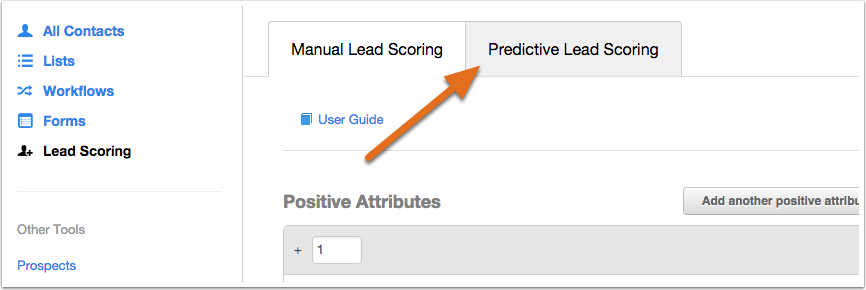
So rather than a marketer trying to guess what the contributing factors are to a good lead that might close, that's a very useful problem for machine learning. Let's just pump a ton of data through and the software is much better at telling you which leads will convert than a human would be. Our email stuff, we're really applying machine-learning to predict which email addresses are going to be crappy email addresses and which ones are gonna be real and making sure the pool of email IPs we have stay clean.
So there is machine learning happening in and outside of HubSpot in a relatively big way right now. We try to insulate all that complicated stuff from our users. But we're leaning pretty heavily into it. I just think it's a new to build software. And we're a particularly good fit for it because we have so much data. Machine learning is not particularly useful unless you have a lot of data to train it. And we have data about everything. About your visitors, about your leads, about your customers, about journeys, about you name it. We have data about it and we can use that data to help train the software to make it more useful.
We asked Brian what personality traits he observes in successful marketers
Back to top
Brian: Somebody gave me this quote recently, "I much prefer a learn-it-all to a know-it-all." And particularly for marketers and sellers because your buyer is changing so much and the technology landscape's changing so much, I feel like if you're a marketer or you're a seller and you're using the playbook you used even 10 years ago in your career, that you've built your career on a certain playbook, that whether you like it or not those playbooks are getting a little dated. And you need to stay up to date.
So I don't care how old somebody is but if they're a learner, I like them. Because you're staying up to date with not just new technologies but new ways of go-to-market. Because we're living in a sea change in sales and marketing. I think it's a wonderful time to be in sales and marketing if you're a learner. If you're kind of stuck in 2007 and you're using playbooks from back then, boy it's a tough, tough time to be buying lists and emailing people. A tough, tough time to be buying lists and cold calling people. It's a tough, tough time to be buying TV ads. Like that stuff just doesn't work anymore. And so I like learn-it-alls.
Craig: That's actually really motivating for us and I think our listeners as well. I think if people are listening to our podcast, they'd probably be more inclined that way anyway. So that's excellent.
Brian: I suspect you're right. Yeah. I suspect you're right.
Back to top
Ian: So Brian, if you're starting out in marketing today, fresh out of college, what is one thing you would make sure you're up to speed on as a primary priority for your career growth?
Back to top
Brian: Well, I would get certified in all the stuff HubSpot offers. So we have a whole slew of courses. Inbound marketing, content, all kinds of courses on there that are free. And I'm just seeing more and more companies wanting to find people who are certified on this stuff. And you can command, yeah. You can commands jobs, you can command money, you can command opportunity. If you're and you really understand the stuff. It's not that easy to get certified. So if you work at it, you can do it. So that's one thing I would do.
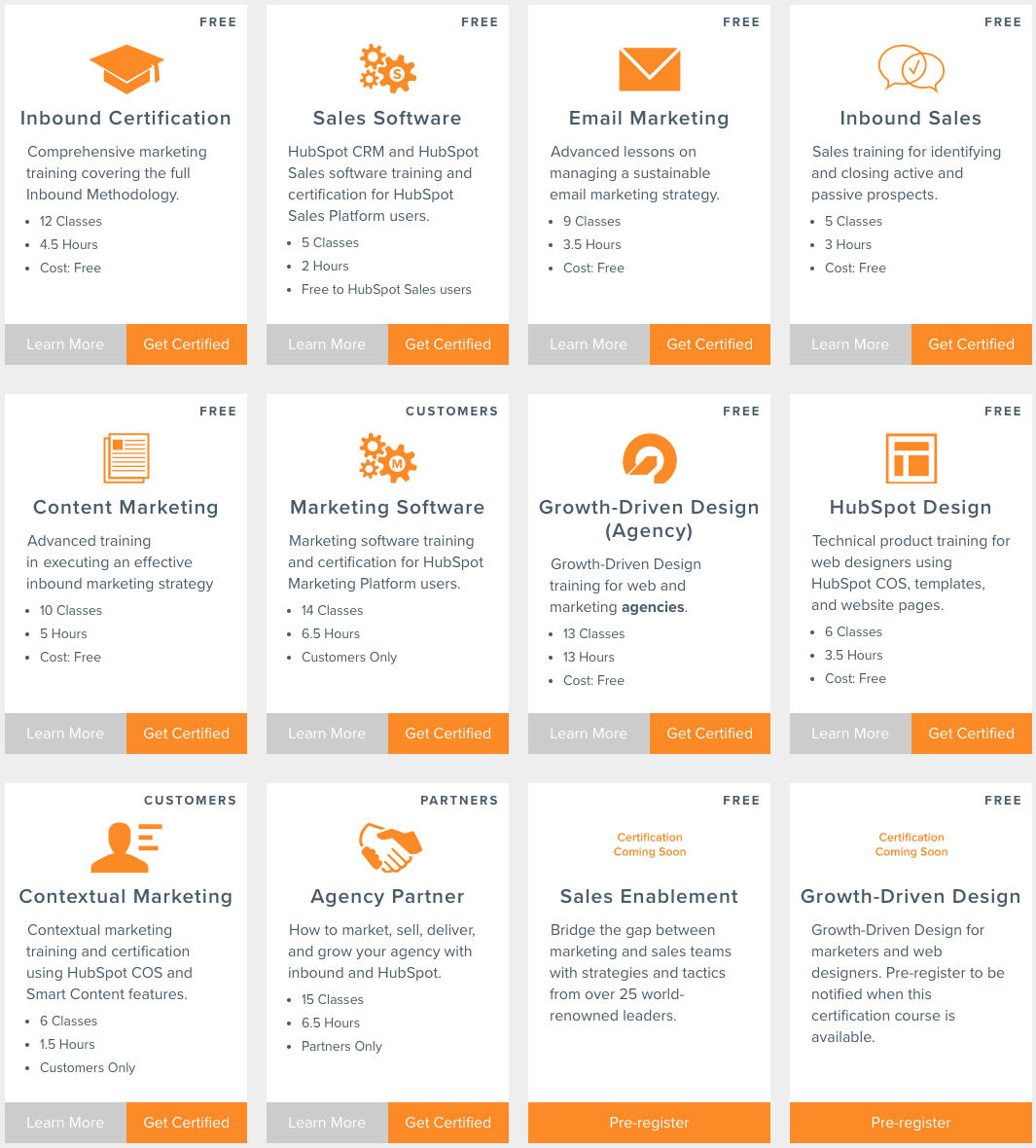
I would work for a growing company if I were just coming out of school and in marketing. When you're in a growth company, there is opportunity that opens up. People are getting promoted and the organization is growing and you get lots and lots of new opportunities. Particularly if you're a learn-it-all. Particularly if you're geeked out and getting certified in all this new stuff. You're gonna get pulled into all sorts of new things.
Back to top
If you're in a company that is a little bit stuck, you know, maybe it's 10 employees and it's been the same 10 employees for 10 years, you're joining there. It's hard to get exposure to new things. It's less re-organization going on, less new initiatives happening. So I would try to get into a growth organization and be part of growth. There are very few companies out there that don't wanna grow. So to the extent you can be aligned with growth and figure out how to acquire leads and customers more efficiently, gosh, you're gonna have a really good career.
Back to top
Craig: One of the things we both loved that Gary Vaynerchuk said in his keynote at Inbound last year was this idea of being a practitioner. That's kind of, it cannot just be theory these days. And that's something we notice especially with HubSpot people and teams. It's always about learning and hands-on. So that's something you've definitely instilled across the enterprise.
Brian: Oh. That's good. That's good. I liked Gary Vaynerchuk's presentation at Inbound. That's up and available and free with no form or anything on inbound.com. I'd encourage folks to look at that. I thought he was spot on in his comments at Inbound. I personally found it very motivational.
Ian: Well, Brian. Thank you so much for your time today and for letting us interview you.
Brian: Great. Great, Thank you guys and thanks for creating this podcast. It's awesome. I listen to it. I drive down to Newport Rhode Island on the weekends and I listen to it. I really enjoy it.
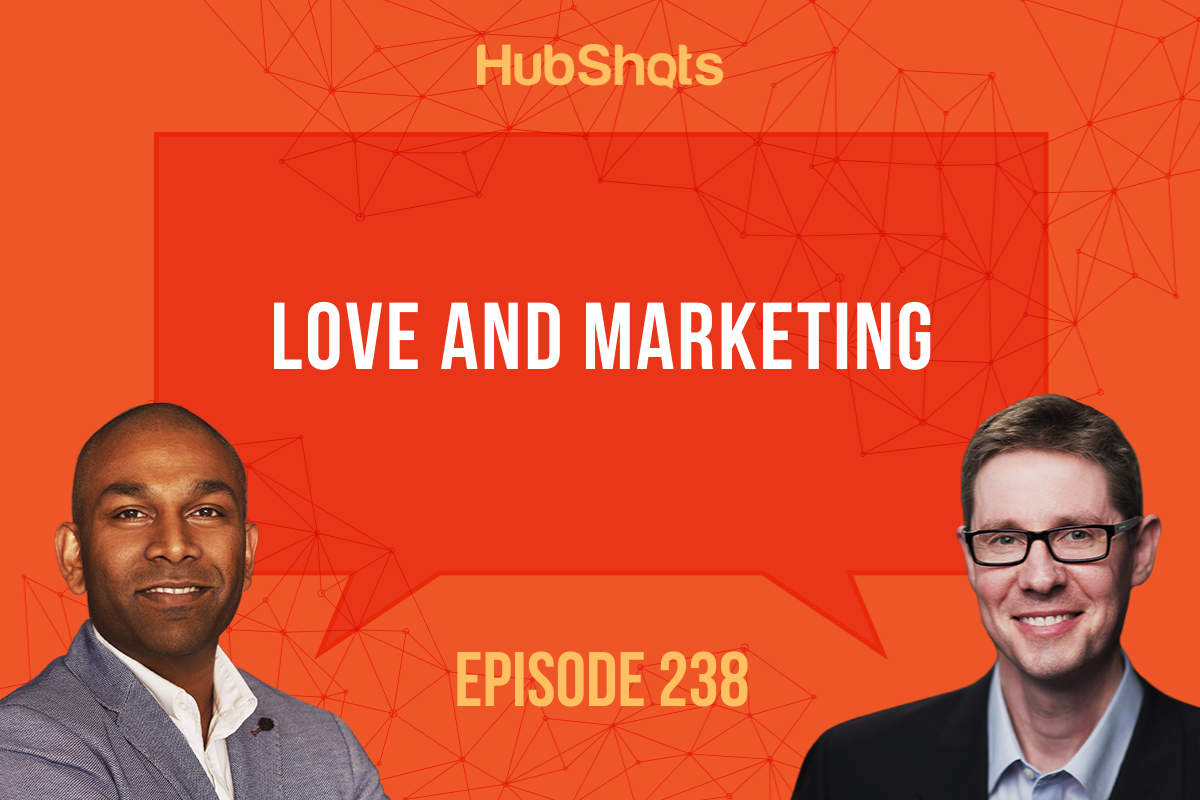
Welcome to HubShots Episode 238: Love and Marketing This edition we dive into: Love The Bud of Mended Bones - a poem for Brian Halligan HubSpot...
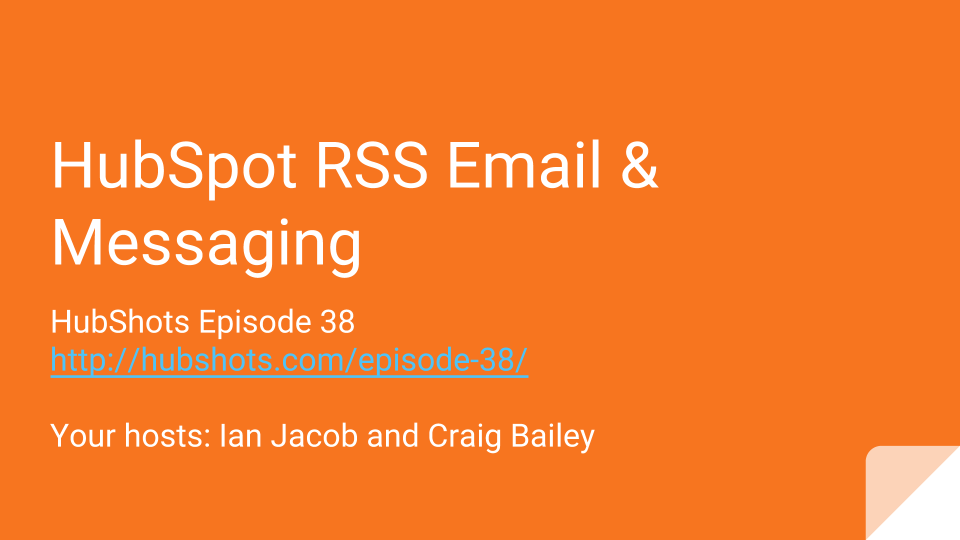
Welcome to Episode 38 of HubShots! Recorded: Wednesday 15 June 2016 This week we're testing adding the show notes in a range of formats. You can ...
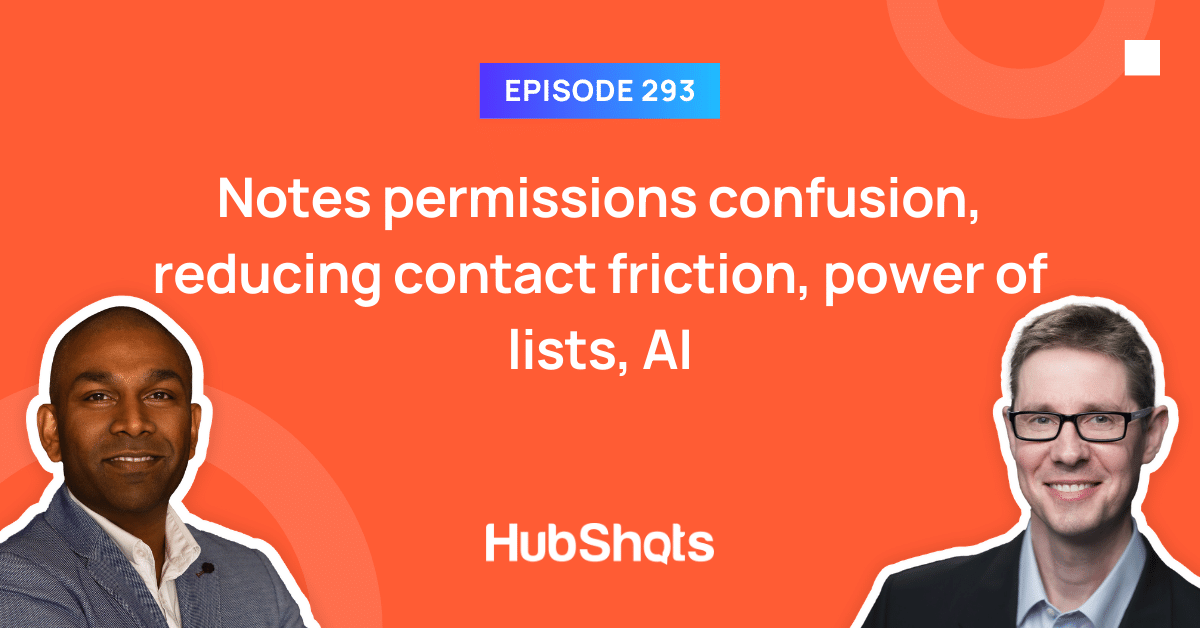
Welcome to HubShots Episode 293: Notes permissions confusion, reducing contact friction, power of lists, AI This edition we dive into: Obligatory...
